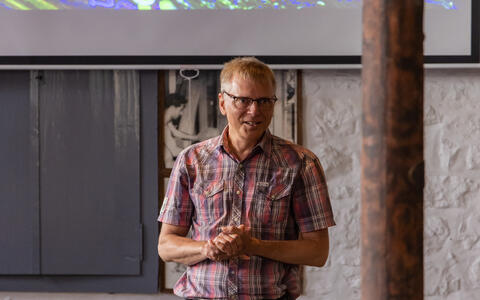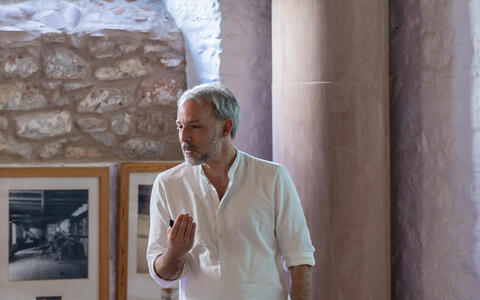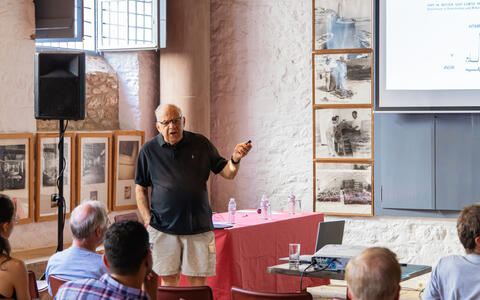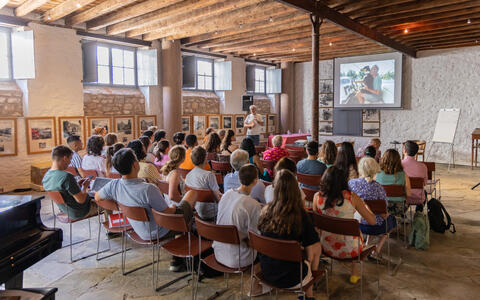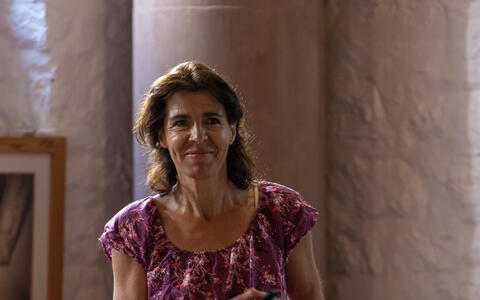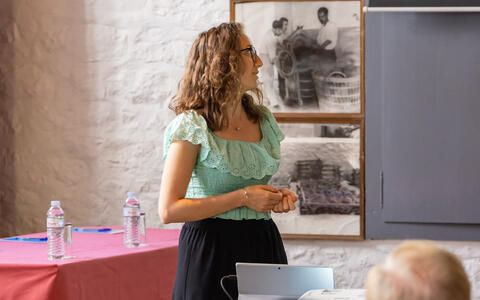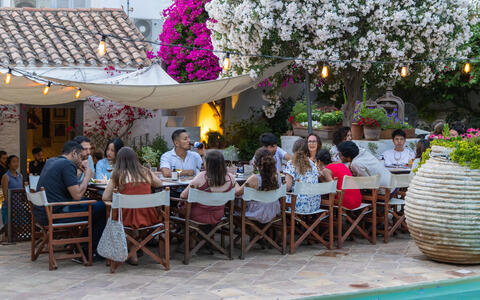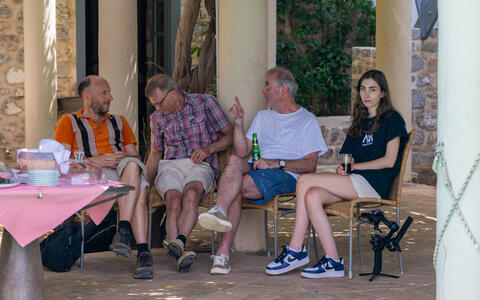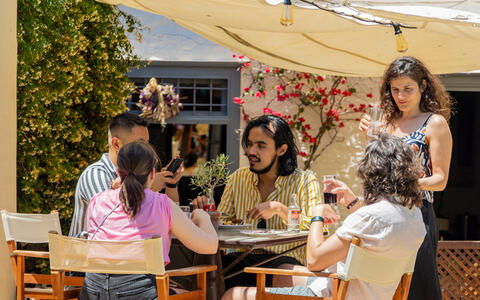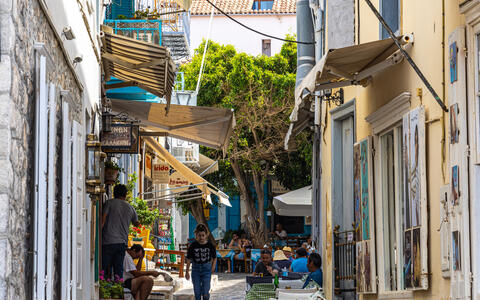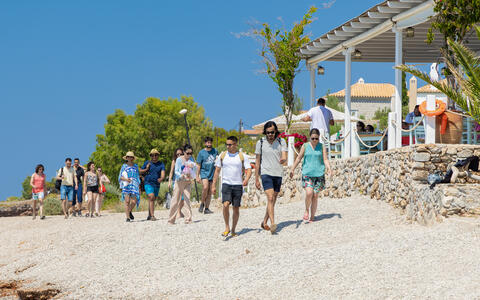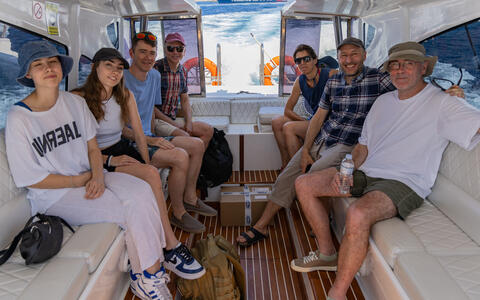Thinking outside the box – not only on Hydra
Gary Lewin
MDC: Gary Lewin, you have lab retreats with your team every year. But this year’s scientific symposium on Hydra included more than 50 people and several keynotes. That was something else.
Professor Gary Lewin: I wanted a special event for the anniversary: 25 years of the Lewin Lab. In the past we used to go to Bad Schandau or to the Baltic Sea. Usually we don’t have lab retreats outside of Germany. We always invited one or two external speakers. But in 2019, I got the Ernst Jung Prize for Medicine for my achievements over the last 20 years. I thought it would be nice to give it back to celebrate my 25-year anniversary. In typical fashion, I decided to spend it on a little bit of a party.
- Sensational Biology symposium on the Greek island of Hydra
-
Further information →
-
Somatic sensation encompasses all sensation felt after stimulation of the body, such as touch, temperature, limb movement and pain. The international symposium “Sensational Biology” will bring together leading researchers on somatic sensation to discuss the most recent developments and concepts. The setting will also provide students and young researchers with ample opportunity to interact and engage with experts in the field.
Professor Stefan Lechner: You shouldn’t get the wrong impression. It was not a party at all. I mean, it was very entertaining, I enjoyed it a lot. But it was also a very good scientific conference, considering the lineup of people who were there.
Lewin: Yes, I was quite pleased about how many people turned up. The earliest MDC graduate student who came was Jung-Bum Shin, he left in 2001 and is now a professor in Virginia. And of course, we had Lorne Mendell, who was my postdoc advisor. I would have had my PhD advisor Stephen McMahon there as well, but he sadly died last year.
MDC: What else do you remember very fondly of Hydra?
Patrik Ernfors was a guest speaker. He is part of the Nobel Prize Committee.
Lewin: That it was really nice and relaxed. My present students and postdocs had the opportunity to meet some very prominent people: Patrik Ernfors is a pretty famous neuroscientist in Europe – he happens to be a member of the Nobel Committee for Physiology or Medicine. You wouldn’t meet him in a normal meeting in such a relaxed atmosphere.
Lechner: This is something that Gary has always supported. He takes his postdocs to meetings and introduces them. This is how you build a network and why the atmosphere in Hydra was almost private. He’s not that kind of guy who goes to a private dinner with other big shots. He actually goes to the bar and takes all his co-workers with him.
Lewin: Yes, it is important. They have to learn to go to meetings themselves and approach people. Personal connections in the field are a kind of invisible glue that keeps the academic world together.
Lechner: And I really enjoyed the concept talks of your students. You encourage people to think outside the box. There was not a single one who didn’t come up with some nice idea, right?
Lewin: We have a tradition that started after Stefan left my lab: When we have a retreat, I ask my students or postdocs to give a 10-minute presentation about a topic that has nothing to do with what they’re working on. So they have to come up with something completely different, a new idea or a problem that they would like to solve if they got resources for it – a good basis to discuss stuff. It’s an exercise in creativity.
Stefan Lechner was a postdoc in Lewin's research group at MDC.
MDC: Is that typical for your former mentor, Mr. Lechner?
Lechner: Well, he supports and promotes scientific independence in his students. Not only with concept talks, but actually in everyday life with every chat you have with him on the corridor, in his office or in the lab. I think that’s why he always left at three o’clock in the afternoon, because he was fed up with chatting. He went home to his office in the attic and started his real work. And then you would get an email at 11 in the evening or at midnight. Now I fully understand all of this. You’re in the lab the whole day, you try to motivate people, encourage them: looking at the data, discussing ongoing projects, problems, etc. And then at night you do your real work that you're actually supposed to do when you have some extra time at home.
- Stefan Lechner
-
Further information →
-
Stefan Lechner was a postdoctoral fellow in the Lewin Lab from 2006 to 2013. He is now the Professor for Experimental Anesthesiology at the University Medical Center Hamburg-Eppendorf (UKE) and a group leader at Heidelberg University.
Lechner Lab at Heidelberg University
Lewin: What he means by real work is writing the papers, responding to emails, stuff like that. I personally cannot work in the lab, even though I have a nice big office now. I remember one EMBO study asking who are the most successful PIs. Those who are not sitting in their office and writing grants. The most successful PIs are wandering around the lab, chatting. I was famous for always stuffing my nose into Stefan’s setup and seeing what’s going on.
Lechner: The funny thing is, I do the same thing. And I wonder if I do it because it’s kind of normal for me? Is it your influence or would I have done it anyway?
Gary Lewin worked for nearly four years as a postdoctoral fellow in Lorne Mendell's research group at the State University of New York at Stony Brook.
Lewin: I think I got it from my PhD advisor. And Lorne Mendell was very much the same. All of this stuff is what I rebel against: Having a very structured environment as a PI. Sometimes prospective PhD students ask me: “How many meetings do we have? Do I have a slot every day? Or do I get two hours a week?” I say: “Well, no! But my doors are always open. And I’ll come around the door to you.” I can see that many people may not be able to work with that. But in general, I think I’ve had very few unhappy people in my lab.
Lechner: You can’t make everyone happy. But Gary’s lab produced a lot of people who made a really successful career in science, people who are able to think independently.
Lewin: About 60 percent of my postdocs are group leaders now. I always tried to give them a really large degree of freedom to develop their own stuff, an essential thing for an academic career: Showing that you’re able to come up with something new. And that’s where the creativity or the thinking outside the box happens.
MDC: Do you have an example for that?
Lewin: Recently, just before the pandemic, two postdocs in my lab, Jane Reznick and Alison Barker, organized a meeting under the auspices of EMBO. They did most of the work and used my influence. I was only co-organizer, Jane was the chair. It was an incredibly important networking event. Both of them moved on to be group leaders. Unfortunately, they couldn't make it to Hydra.
MDC: In 1996, you came as a group leader to the MDC. Do you remember the beginnings of working in Berlin?
Lewin: The MDC campus was an active political scene. Everybody in the institute was basically classified: Are you coming from outside? Are you a “Wessi” or an “Ossi”? As a foreigner, I had a privilege, nobody saw me as “Wessi.” I didn’t count in this debate. And nobody could speak English when I started. I had to learn German to speak to my technicians. But the MDC was a great place to start. In those days, it was the “Wild East” and very different from anywhere else in the world: Out of the way for most Western scientists, a very unusual place to move to. The people who came had to be a little bit off the scale. For example, one of my first postdocs who is now a professor in Trieste. I picked him completely illogically: He was unemployed in London hacking computers. He was absolutely keen to come to Berlin. And he managed to get almost a stellar elitist career together, being an EMBO group leader. Attracting those kinds of people was much easier in the early 90s.
Lechner: This is one of his major strengths, picking the right people. I still don’t know how he does it: Gary senses who will be successful and who won’t.
Lewin: Sometimes I wonder myself why I pick that person. I go by gut feeling, more than I do by CV. A lot of PIs pick someone for a special technique, for example to analyze single-cell sequencing data. They don’t care who it is. They just want to hire someone who can do it. But I don’t hire people just for a technique. I hire them for their willingness to learn.
MDC: How did the atmosphere at MDC change over time?
Lewin: At some point, it was a relief that people didn’t talk about East and West all the time anymore. The transition started in the early 2000s. And now it’s very different but still very good. People still want to come to Berlin but their motivations are less edgy and more obvious than they were in the late 1990s.
The symposium on Hydra brought together (former) colleagues, PhD students from Lewin's lab, and leading experts in the field of somatosensory perception.
MDC: How did the coronavirus pandemic affect your work?
Lewin: It delayed Hydra by a year, which was a shame. My PhD advisor was alive last year, and he would have definitely been in Hydra. That made a big difference. And the pandemic in general: my lab survived quite well, scientifically. The MDC lockdown had very little influence on our work. It is actually nice to get back to normal. Hydra was the first small meeting I’ve been to.
MDC: Mr. Lechner, how would you describe working with Gary Lewin in three words?
Lechner: Well, I really think that “supportive” is an important word. Very knowledgeable. And I always remember the word “auffällig” but in a good way.
MDC: Why “auffällig”?
Lewin: So there is a background story behind it and it’s got to do with the MDC Personnel Department, an external consultant or “Berater” and a “Jahresgespräch.” They tried to make us as group leaders to do certain checklists for these annual reviews. I refused to do these checklists. So I was accused of being “auffällig” because of my, let’s say, rebellious nature.
Christina Anders conducted the interview



